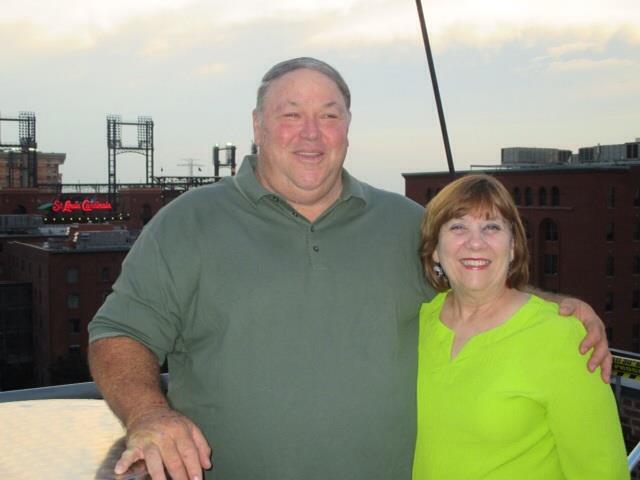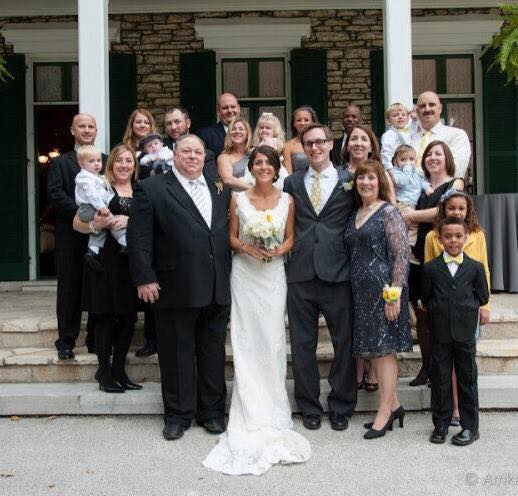When Lightning Strikes Twice
Topic: Announcement, Hide on Homepage, Real Talk: Survivor, Patient & Family Stories, Your Source for Breaking News & Inspirational Stories

Terry Rau, Jr.
It was as if lightning had struck twice. After all, what are the odds that both of my parents would be diagnosed with pancreatic cancer?
My parents, Terry Sr. and Sharon, were the heart of our family. As the only boy in a family with five sisters, Dad and I shared a very special bond. Dad was a teacher and football coach who then worked for a painting company. Mom was a community nurse who taught local classes so her flexible schedule would allow her to be home with the six of us a lot of the time. To my parents, their kids were their life, and once we were all adults with our own families, they shifted their focus to making memories with their grandchildren. Since three of my sisters and I lived near our childhood home in St. Louis, and our other two sisters were just a couple of hours away, we used to get together frequently. Our kids became the playmates to each other that we were as siblings growing up.
Everything changed in 2013—the first time “lightning” hit our family. That summer, Dad, just 66, was experiencing abdominal discomfort and digestive issues, and his doctor immediately sent him for a CT scan. The scan revealed a grapefruit-sized tumor in his pancreas, and he was diagnosed with Stage 4 pancreatic cancer. Just 27 days following his diagnosis, before we could fully understand what was happening and before a treatment plan could even be put into action, he passed away.
Dad’s death shook our family to the core. How can someone be healthy and full of life and then gone less than a month later? He had worked so hard to support us while we were growing up and often wasn’t home, and now that he was finally retired, he was looking forward to more quality time with Mom and his grandchildren. Even though we could barely process this tragedy, my sisters and I pulled together for Mom and made sure she was never alone during those first few months after his passing.
Then, less than three years later, while we were still dealing with the hole in our hearts from seeing Dad’s empty seat at family get-togethers, “lightning” struck again. Mom’s urine was an abnormal color, which led to a series of scans. When the results of her endoscopy came back showing Stage 1B pancreatic cancer, we were shocked and afraid we’d lose Mom, just a couple years after losing Dad. We were relieved that Mom’s disease was found early before it had spread, which gave us a chance to come together to process the diagnosis, gather information, and find the best doctors and treatment plans. First, she underwent a Whipple surgery, which offers the best chance for long-term survival. This complex procedure involved removing part of Mom’s stomach, the duodenum (the first part of the small intestine that connects to the stomach), the head of the pancreas, part of the bile duct, the gallbladder, and lymph nodes in the area around the pancreas.
After she recovered from the surgery, she was treated with chemotherapy. I cherish the memories made during the four-hour chemotherapy sessions I accompanied her to. I always brought my laptop, thinking I’d work during her infusions, but I never even turned it on! Some of our deepest conversations took place during that time, and what I remember most is just how tough she was, and how hard she fought this disease so she could have more time with her family. Instead of her being sick, I focused on our talks and the laughter we shared during that devastating time. I would advise anyone going through the ordeal of watching a loved one experience pancreatic cancer to concentrate on the present and not think about what the future may hold.
In the fall of 2016, Mom rang the hospital bell signifying she had successfully completed treatment. We thought the worst was behind us until a follow-up scan done a few weeks post-treatment revealed the cancer had spread to her liver and bones. We were crushed but committed to spending as much time with her as possible. We took a family trip that November, with the six of us and our spouses, and all the grandchildren. By the end of the holiday season, she was extremely ill, and she passed away in January 2017, when she was just 69. We were grateful to at least have more time—nearly a year—with Mom after she got sick. As if losing my parents wasn’t hard enough, two of my sisters were subsequently diagnosed and treated for breast cancer. We’re in the process of undergoing genetic testing to determine if there’s an inherited gene mutation that contributed to their breast cancer and my parents’ pancreatic cancer diagnoses and that my other sisters and I might also carry.

My brother-in-law started the Bag-A-Cure event featuring cornhole—a popular, family-friendly game in our St. Louis hometown—as a way to honor Dad’s memory, and it’s now become an annual tradition to celebrate Mom’s and Dad’s lives and legacies. For the past eight years, the event has been held in October on the Sunday closest to Dad’s birthday (October 17). I’m so fortunate that my employer purchased all of the cornhole bags, and my friend built our cornhole sets specifically for this event. Two years ago, I took over the event, and we’ve added a silent auction and expanded our team of event organizers, and most importantly, we continue to raise more money every year.
I’m so honored that my family, friends, and I are doing our part to support the Lustgarten Foundation and get to a place where outcomes become less bleak and patients and their loved ones can focus on the time in front of them, because time is everything. I am dedicated to supporting the Foundation’s research efforts to advance early detection and new treatments. I’m grateful that 100% of every donation directly funds research, because only through scientific discoveries will new treatments and a cure be possible someday.
By the time I was just 35, I had lost both my parents. Their passing has changed my outlook on life, as I now realize time with my family, especially my wife and two children, is truly the most valuable resource. Now, I’m committed to fighting pancreatic cancer and making sure this devastating disease doesn’t strike again in my family and doesn’t take away anyone else’s parents or other loved ones.

